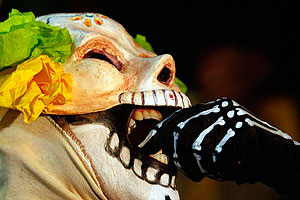
When Lalo Alcaraz learned this week that Disney was seeking to trademark “Dia de los Muertos,” the name of the traditional “Day of the Dead” celebrated by millions in Mexico and the US, the cartoonist had an idea.
The trademark was for an animated movie by Disney and Pixar Animation Studios that is inspired by the holiday.
The Los Angeles-based humorist created a movie poster that quickly went viral of a skeletal Godzilla-sized Mickey Mouse, with the words: “It’s coming to trademark your cultura (culture).”
Anger and ridicule expressed on social media largely by Latinos began circulating. On Tuesday, Disney said it was no longer seeking a “Dia de los Muertos” trademark request because the film’s name will change before its release.
“Disney’s trademark filing was intended to protect any potential title for our film and related activities,” a company statement said. “It has since been determined that the title of the film will change.”
Disney has not said that social media responses were responsible for the withdrawn trademark request. The company did not immediately return a phone call from The Associated Press.
Whatever the reason, the episode showed how quickly reactions to even the smallest corporate move can spread online and lead to calls for boycotts.
“It was not social media that started this. It was Disney that started this,” said Tom Garrity, head of the Garrity Group, a public relations firm that advises companies on social media practices. “Social media only highlight the deficiencies in Disney’s planning and what people saw as cultural insensitivity.”
The Disney request momentarily replaced immigration as the hottest topic among Latinos on Twitter, said Elianne Ramos, vice chair of LATISM, a non-profit group Latino social media group. She noticed the trend by monitoring posts on Twitter and had planned a live tweet town hall until the trademark request was withdrawn.
“Some people saw it as an attempt to own our culture and profit from it,” she said.
Critics said they were concerned about the company attempt to trademark a cultural holiday like November’s Day of the Dead and its history of trying to profit from cultural icons.
“This is a corporation that has consistently co-opted culture for profit,” said Andrea Quijada, executive director of the Albuquerque-based Media Literacy Project, a group that focuses on media literacy and policy. “Just look at Pocahontas, Mulan, Jasmine,” Quijada said, referring to characters from Disney films.
Not only was the move seen as insensitive, critics said, trademarking the popular holiday put thousands of businesses that made products linked to the day at risk. Disney had hoped to secure the naming rights for merchandise such as snack foods and Christmas ornaments.
“It’s a terrible idea. I’m outraged,” said Kiko Torres, owner of Masks y Mas in Albuquerque, a shop that sells Day of the Dead art and clothing year-round. “I mean, what’s the purpose of that”
The Day of the Dead honours departed souls of loved ones who are welcomed back for a few intimate hours. At burial sites or intricately built altars, photos of loved ones are centred on skeleton figurines, bright decorations, candles, candy and other offerings such as the favourite foods of the departed. Pre-Columbian in origin, many of the themes and rituals are mixtures of indigenous practices and Roman Catholicism.
Ad Feedback
In the last decade or so, this traditional Latin American holiday has spread throughout the US along with migration from Mexico and other countries where it is observed.
Not only are US-born Latinos adopting it, but various underground and artistic non-Latino groups have begun to mark the Nov. 1-2 holidays through colourful celebrations, parades, exhibits and even mixed martial arts fights.
Lois Zamora, a University of Houston English professor who has studied the Day of the Dead, said Disney’s interest shows how much this once obscure holiday has grown in the US But she said the trademark attempt was odd.
“Disney doesn’t quite get it,” Zamora said. “It would be like copyrighting ‘Christmas or ‘Easter’ or, for that matter, ‘Halloween.”‘
Graham Harvey, owner of the Thibodaux, Louisiana-based Matthew Media group, said the Disney flap should be a reminder that all companies should have social media strategy as part of their promotions, or face the wrath in real time if any promotion is controversial.
“Any company or organization that wants to protect its brand needs to understand the powerful, viral nature of social media,” he said. “A backlash can occur in the blink of an eye.”
– AP